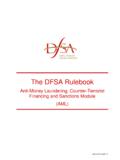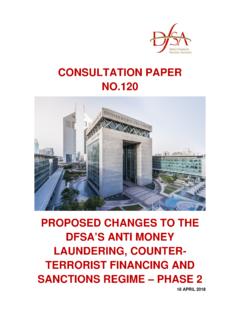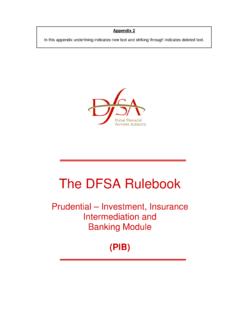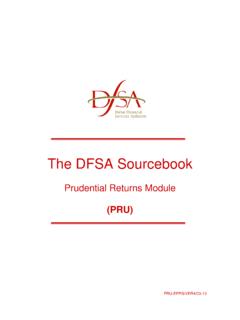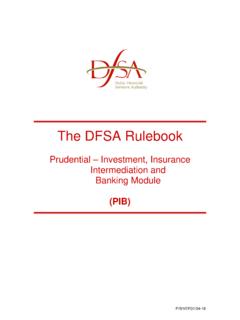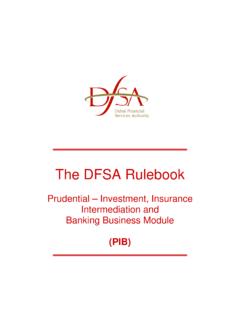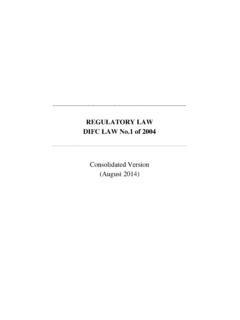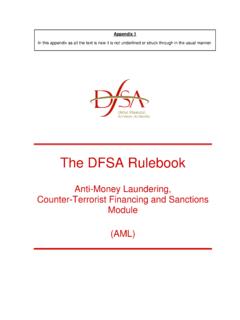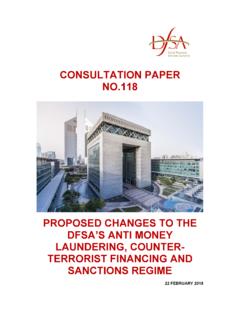Transcription of DFSA Consultation Paper
1 Consultation Paper MISCELLANEOUS CHANGES 5 MARCH 2018 CP117 MISCELLANEOUS CHANGES 5 March 2018 2 PREFACE Why are we issuing this Consultation Paper (CP)? This Consultation Paper seeks public comment on the DFSA s proposals to make a variety of amendments to the DFSA s policy framework, as expressed through its Rules. The DFSA has collected a number of miscellaneous amendments to the modules of the DFSA Rulebook; each item in this Paper is a discrete amendment. Who should read this CP? The proposals in this Paper should generally be of interest to Authorised Firms, to applicants and to their advisers. Item 2 will be of particular interest to firms with discretionary mandates; Item 3 to banks; and Item 4 to Fund Managers and their advisers.
2 Terminology In this CP, defined terms are identified by the capitalisation of the initial letter of a word, or of each word in a phrase, and are defined in the Glossary Module (GLO). Unless the context otherwise requires, where capitalisation of the initial letter is not used, the expression has its natural meaning. What are the next steps? All comments should be emailed to using the table provided in Appendix 7. Please refer to the CP number in the subject line. You may identify the organisation you represent in providing your comments. The DFSA reserves the right to publish, including on its website, any comments you provide, unless you expressly request otherwise at the time of making comments.
3 The deadline for providing comments is 4 April 2018. Once we receive comments, we shall consider whether any changes to these proposals are required and then seek approval from the DFSA Board for the finalised proposals. Once the proposals are approved, we shall issue a notice on our website to this effect. Structure of this CP This Consultation Paper contains: (a) Item 1: Definition of Credit Facility; (b) Item 2: Holding Client Assets and Client Money; (c) Item 3: Calculation and reporting of the Maturity Mismatch Ratio; (d) Item 4: Fees applicable to Funds; (e) Item 5: Other matters; CP117 MISCELLANEOUS CHANGES 5 March 2018 3 (f) Appendix 1: draft amendments to the GLO Module; (g) Appendix 2: draft amendments to the COB Module; (h) Appendix 3: draft amendments to the PIB Module; (i) Appendix 4: draft amendments to the FER Module; (j) Appendix 5: draft amendments to the GEN Module; (k) Appendix 6: draft amendments to the MKT Module.
4 And (l) Appendix 7: template for providing comments on this Consultation Paper . CP117 MISCELLANEOUS CHANGES 5 March 2018 4 Specific issues 1. Definition of Credit Facility Please see proposed changes to GLO Module in Appendix 1. 1. The term Credit Facility is currently defined in the Glossary (GLO) Module as: Any facility which includes any arrangement or agreement which extends monetary credit whether funded or unfunded to a Person including but not limited to any loan or syndicated loan, mortgage, overdraft, financial lease, letter of credit, financial guarantee, trade finance, transaction finance, project finance or asset finance. 2. The inclusion of the phrase including but not limited to in this definition indicates that other contracts or financing arrangements, not included in this list, may nonetheless fall within the definition.
5 3. During recent discussions, it has become clear that a number of types of business that we consider to be credit facilities are not always seen as such by stakeholders. This has arisen, in particular, in relation to invoice financing and factoring . 4. To put the position beyond doubt, we propose to add to the definition of Credit Facility the items invoice financing or discounting and factoring . 2. Holding, and reporting on, client assets and client money Please see proposed change to COB in Appendix 2. Mandates 5. As part of the changes made in 2017, arising from CP1061, we introduced into the COB Module Rule (d), which states: Client Assets are held or controlled by an Authorised Firm if they are.
6 (d) held in the Client s own name, but the Authorised Firm has a mandate from the Client to manage those assets on a discretionary basis. 1 CP106: Regulation of Arranging, Representative Offices and Financial Promotions, 21 June 2016. 5 Please see proposed changes to COB (d) and (2)(g) in Appendix 2. 6. This clarified that the Client Assets rules do apply in those situations where a firm holds a discretionary mandate, often through a Power of Attorney, regardless of whether the assets are held in the Client s own name. However, when making this change we did not make a necessary consequential change in COB , which sets out the Rules on Client Money.
7 COB (d) states: All Money held or controlled on behalf of a Client in the course of, or in connection with, the carrying on of Investment Business or the Operation of a Crowdfunding Platform in or from the DIFC is Client Money, except Money which is: .. (d) in an account in the Client s name over which the Authorised Firm has a mandate or similar authority and who is in compliance with Rule (2); .. 7. Some firms have read COB (d) as meaning that no monies held under a mandate are Client Money, even though COB (d) confirms that assets held under a discretionary mandate are Client Assets. This is not the outcome intended by the changes made as part of the CP106 process, which was, as noted above, to clarify that the Client Assets rules do apply to assets, including monies, held under a discretionary mandate.
8 8. Given the above, we propose to amend COB (d) to remove the potential for confusion. Disclosure to clients when their assets and/or money are held in another jurisdiction 9. The DFSA s Client Money and Safe Custody rules allow some discretion to firms in terms of where and how assets are held. Amongst other elements of discretion, it is possible to hold such assets in a jurisdiction outside the DIFC. 10. Where firms take this option, they are required to disclose to clients that assets are held in another jurisdiction, and that the market practices, insolvency and legal regime in that jurisdiction may differ from that in the DIFC (see COB (d) and (2)(g)).
9 11. The intention of these rules is not for clients to be told simply that there may be differences in regime. There should also be an explanation of any actual differences between the regimes applicable in the DIFC and other jurisdiction, together with an 6 Please see proposed changes to the Guidance in COB in Appendix 2. indication of the possible consequences for the client of these differences. 12. Requiring such an explanation does not increase the burden on firms. Under COB , for Client Money, and COB and , for Safe Custody, firms are already obliged to carry out due diligence in relation to use of third-party agents, including looking at the relevant insolvency regime.
10 The obligation on firms to provide disclosure, under COB (d) and (2)(g), is simply a matter of disclosing pertinent elements of the due diligence carried out, or the conclusions of that due diligence. 13. A consideration of any potential consequences arising from any differences of regime should also not be onerous. Under (2) and (3), the firm should already have reached a conclusion on whether the arrangements with a third-party, including where that third-party is in a jurisdiction other than the DIFC, provide equivalent protections. 14. The information provided by firms to clients, in the circumstances set out in COB (d) and (2)(g), must be communicated in a way that is clear, fair and not misleading, in line with the requirements of Principle 6 (GEN ).
